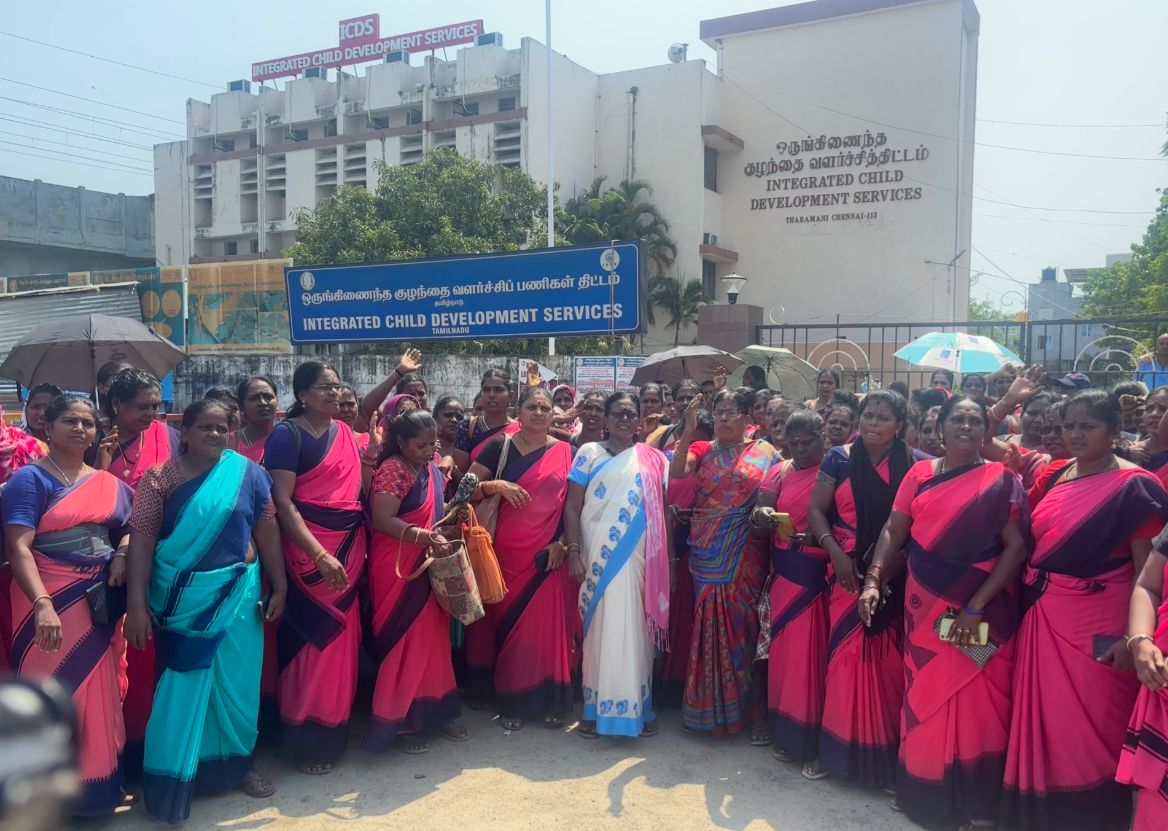One of the major issues highlighted in the ongoing protest is the demand for summer leave. Anganwadi workers argue that, like other government employees, they too deserve a summer break, particularly during the sweltering heat of May.
Published May 03, 2025 | 5:01 PM ⚊ Updated May 03, 2025 | 5:01 PM

More than 50,000 Anganwadi workers have been protesting across Tamil Nadu, urging the government to grant them rights and benefits comparable to those of other government employees. (Supplied)
Synopsis: Two years ago, in 2023, a delegation of Anganwadi worker union members met with Social Welfare Minister Geetha Jeevan and submitted a 20-point charter of demands. The union claimed that while the minister promised to fulfill these demands gradually, only two demands have been met so far. The minister, however, said that most of the demands have been met.
Anganwadi workers across Tamil Nadu have launched a massive protest in all 38 districts of the state, raising several demands.
More than 50,000 women have participated in this protest for the past two days, urging the government to grant them rights and benefits comparable to those of other government employees. Chief among their demands is the provision of a full month of summer vacation during May.
Anganwadi workers are the backbone of early childhood care services in the state. Despite their critical role, they have often been denied basic facilities, fair wages, and due recognition. While the Tamil Nadu government has introduced several schemes aimed at child welfare and nutrition, the workers who implement these schemes on the ground say they are being neglected.
Various welfare schemes like the Chief Minister’s Breakfast Scheme, Nutritious Meal Scheme with eggs, supplementary nutrition for young children, and maternity benefits for lactating mothers are being successfully implemented across the state. These initiatives are central to the well-being and development of children in Tamil Nadu. Anganwadi workers play a key role in their delivery and execution.
Speaking at the launch of the second phase of the “Ootchathai Urudhi Sei” scheme, Tamil Nadu Chief Minister MK Stalin highlighted the success of the first phase. He stated that the programme was introduced in 2022 to eliminate nutritional deficiencies among children. As a result, approximately 77.3% of severely malnourished children had reportedly returned to normal health.
Despite this success, the workers behind the programme—the over 70,000 Anganwadi employees across Tamil Nadu—continue to raise their voices for better working conditions. They complain that even basic needs have not been fulfilled. Timely salaries, infrastructure support, and implementation of long-pending demands remain a dream.
One of the major issues highlighted in the ongoing protest is the demand for summer leave. Anganwadi workers argue that, like other government employees, they too deserve a summer break, particularly during the sweltering heat of May.
Two years ago, in 2023, a delegation of Anganwadi worker union members met with Social Welfare Minister Geetha Jeevan and submitted a 20-point charter of demands. The union claims that while the minister promised to fulfill these demands gradually, only two demands have been met so far.
When they requested summer leave, they were offered a compromise of 15 days off with a promise to increase it to 30 days soon. However, even after two years, this promise remains unfulfilled. The workers now feel betrayed and insist that the full 30-day leave must be granted immediately.
Besides the summer vacation demand, the protesting workers are also calling for the recruitment of staff to fill 28,000 existing vacancies across the state. They are also urging the government to regularise the services of long-serving Anganwadi employees, thereby granting them the benefits and security associated with permanent employment.
However, Minister Jeevan recently told the media that most of the demands have already been fulfilled and dismissed the protests as unnecessary. She warned that disciplinary action may be taken against workers continuing to protest. This has further angered the protesting groups, who argue that the minister is downplaying their legitimate grievances and misleading the public.
In many districts, protesters are braving severe heat without basic facilities. In Chennai, over 200 Anganwadi workers staging a protest in front of the Integrated Child Development Services (ICDS) office were initially denied access to essential amenities such as restrooms, drinking water, and shelter.
The lack of necessities in the scorching heat led to over 10 women collapsing due to heatstroke, requiring hospitalisation. Following this, the workers blocked roads in protest, prompting authorities to finally provide temporary shelter in the form of tents.
Despite these hardships, the Social Welfare Department has yet to initiate any formal dialogue with the protesting workers. According to the Tamil Nadu Anganwadi Workers and Helpers Union, they will not leave the protest sites until their core demands are met.
Union State Secretary D Daisy, speaking to reporters, affirmed that the strike will continue indefinitely until the following demands are fulfilled:
She emphasized that Anganwadi workers are indispensable in implementing government welfare programs and should be treated with the dignity and respect they deserve.
As the protest enters its second day, the lack of response from the authorities continues to fuel discontent. The workers remain resolute in their stand, determined to secure long-overdue recognition, rights, and basic working conditions that will enable them to effectively serve the state’s youngest and most vulnerable citizens.
(Edited by Majnu Babu).
